Nvidia to build AI supercomputers for U.S. Energy Dept and seeks China return

Photo Caption: @nvidia
Nvidia said on Tuesday that it will build seven new artificial-intelligence supercomputers for the U.S. Department of Energy (DOE), while also signalling a desire to regain access to the Chinese market.
Speaking at a developers conference in Washington, CEO Jensen Huang said his company already has about US$500 billion worth of bookings for advanced AI chips.
He emphasised that for the U.S. to “win” in AI, the world—including developers in China—should be running on Nvidia systems. He said: “We want America to win this AI race. No doubt about that. … But we also need to be in China to win their developers.”
Huang thanked U.S. manufacturing initiatives, attributing part of Nvidia’s momentum to them. He praised the “America First” agenda for encouraging domestic investment in advanced manufacturing.
At the same time, he warned that losing access to China—which he described as home to “half of the world’s AI developers”—would hurt in the long run. He said that Nvidia has not applied for U.S. export licences to ship its newest chips to China, saying the Chinese government has “made it very clear that they don’t want Nvidia to be there right now.”
The supercomputers to be built for the DOE will support work on U.S. national security — including nuclear weapons systems — as well as alternative-energy research, such as nuclear fusion.
The largest machine will use 100,000 of Nvidia’s “Blackwell” chips, built in partnership with Oracle, according to Huang’s remarks.
This announcement comes at a time when Nvidia is navigating tensions between the United States and China. While the U.S. has swung between restricting and permitting exports of the firm’s advanced chips to China, Nvidia is positioning itself as central to the global AI rollout — yet without access to China its ambition may face a limit.
Huang also revealed partnerships beyond these supercomputers: a deal with Nokia to invest US$1 billion and support 6G telecom infrastructure; and self-driving car technology initiatives with Uber Technologies and Stellantis.
On the manufacturing front, Nvidia said it is ramping up U.S. production of chips and servers, including working with TSMC in Arizona, and assembly in Texas, as part of a plan tied to hundreds of billions of dollars in investment.
Overall, this step underlines Nvidia’s ambition to anchor the world’s AI infrastructure on its technology — while attempting to reopen doors to China’s large pool of developers, all against the backdrop of U.S.-China technology competition.
Source: The Economic Times




